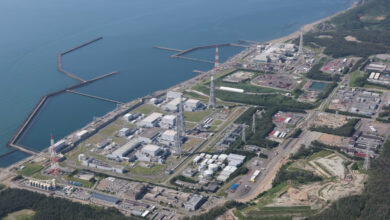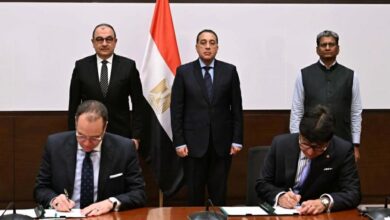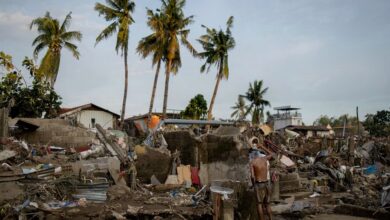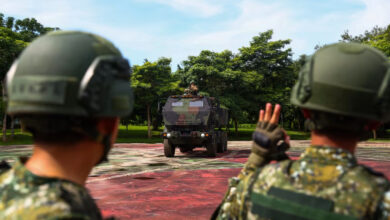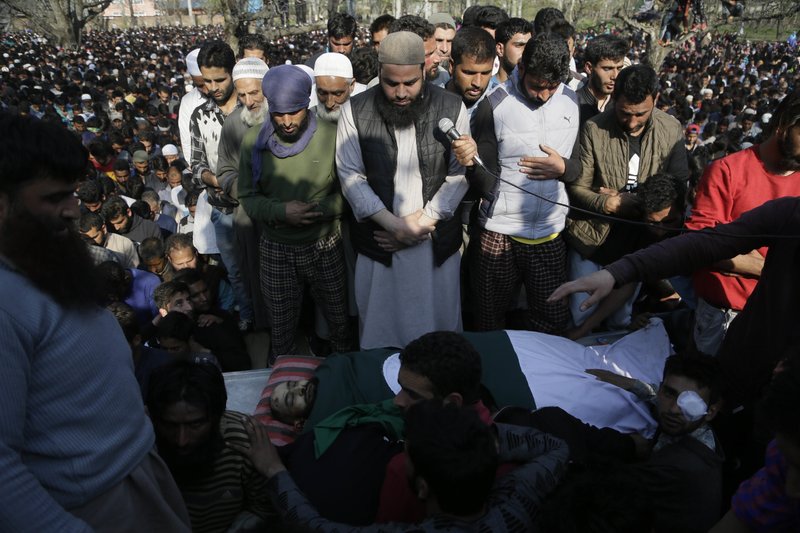
Massive anti-India protests erupted in several parts of the Indian-controlled portion of Kashmir on Sunday amid fierce fighting between rebels and government forces that left at least 12 militants and three army soldiers dead, officials said.
At least four civilians were killed and dozens injured in the latest round of anti-India protests, which broke out after Indian troops launched counterinsurgency operations targeting mainly the southern parts of disputed Kashmir, where new-age rebels have revived militancy and challenged New Delhi’s rule with guns and effective use of social media.
In recent years, Kashmiris, mainly youths, have displayed open solidarity with anti-India rebels and sought to protect them by engaging troops in street clashes during military operations against the militants. The protests have persisted despite the Indian army chief warning recently that tough action would be taken against stone throwers during counterinsurgency operations.
Thousands of Kashmiris hit the streets on Sunday, chanting anti-India slogans and demanding an end to Indian rule over Kashmir as troops launched anti-rebel operations in three southern villages.
By the time, authorities handed over the bodies of some of the slain rebels to their families, tens of thousands had gathered to attend their funerals while shouting slogans like “Go India, go back” and “We want freedom.”
The gunbattles — the deadliest this year in Kashmir — began overnight after government forces raided three southern villages following a tip that rebels were hiding there, police said.
They said that after the government forces came under fire, the militants tried to escape from a security cordon while firing their guns and grenades but were killed in the ensuing fighting.
At least 11 militants, including some commanders, were killed in two separate gunbattles in the Shopian area, while one rebel was killed and another captured in Anantnag, said top police officer S.P. Vaid.
Three soldiers were killed and at least six police and soldiers were wounded, Vaid said.
While eight of the dead militants were identified as local cadres of Kashmir’s largest rebel group, Hizbul Mujahideen, troops were still clearing off the rubble of a destroyed house at a third gunbattle site where bodies of three militants were lying, Vaid said.
Local residents said soldiers blasted several civilian homes with explosives while fighting the militants.
The Indian army’s chief in Kashmir, Lt. Gen. A.K. Bhatt, warned the militants to give up their arms or they would be “neutralized.”
“Anybody who uses weapons (against the state) will be dealt with in the same manner we dealt with the terrorists today,” Bhatt told reporters.
Top separatist leader Mirwaiz Umar Farooq said Sunday’s violence was “more havoc for Kashmiris, who are at the receiving end of execution and repression.”
“Kashmiris will continue to die or be forced to pick up arms for resistance as long as India addresses the political and humanitarian problem of Kashmir through a military approach and through force,” he said.
No rebel group fighting against Indian rule immediately issued any statement about Sunday’s fighting.
As the fighting raged, anti-India protests erupted in several villages in southern Kashmir.
Many protesters also tried to march to the gunbattle sites to help the trapped militants escape, leading to clashes between rock-throwing residents and government forces who fired live ammunition, shotgun pellets and tear gas.
According to hospital officials and police, four civilians were killed and dozens injured, some hit in their eyes by pellets.
Authorities stopped train services and cut cellphone internet services in the most restive towns, and reduced connection speeds in other parts of the Kashmir Valley, a common government practice aimed to calm tensions and prevent anti-India demonstrations from being organized. They also ordered curfews in some southern areas.
Officials ordered all schools and colleges closed on Monday to stop anti-India protests by the students.
Several protests and clashes also erupted in Srinagar and other parts of the disputed region.
Separatist leaders who challenge India’s sovereignty over Kashmir have called for a shutdown on Monday against the killings.
Nuclear-armed India and Pakistan each administer part of Kashmir, but both claim it in its entirety.
Pakistan condemned Sunday’s violence and expressed solidarity with Kashmiris.
“This mindless killing spree exposes, yet again, the ugly, inhuman face of the state-terrorism that India has been perpetrating against the Kashmiris for decades,” Pakistan’s Foreign Ministry said in a statement.
Anti-India sentiment runs deep in Kashmir, which in recent years has seen renewed rebel attacks and repeated public protests against Indian rule.
Rebels have been fighting Indian rule since 1989, demanding Kashmir be made part of Pakistan or become an independent country. India accuses Pakistan of arming and training the rebels, a charge Pakistan denies.
Most Kashmiris support the rebels’ cause against Indian rule while also participating in civilian street protests against Indian control.
Nearly 70,000 people have been killed in the uprising and the ensuing Indian military crackdown.

